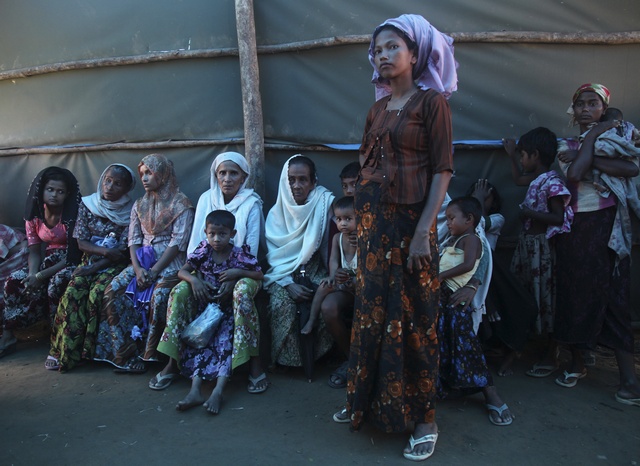Thousands have been forced to flee their homes as the latest bout of communal riots between Buddhists and Rohingya Muslims continues to spread through Arakan state in western Burma.
According to state media, at least two people have died and more than a thousand homes burnt to the ground since communal riots flared on Sunday night in Minbya and Mrauk-U townships north of the state capital Sittwe.
But local sources say casualties are likely to be much higher as the violence continues to spill into new townships. Last night, violence flared in Kyaukphyu along the western coast – a region known for the prevalence of foreign oil and gas projects.
Speaking to DVB by phone on Wednesday, a Kyaukphyu resident said that an Arakanese mob attacked dozens of Rohingya homes last night, forcing hundreds of families to flee.
“Now we’re on a boat in the water, running for our lives. We don’t know where to go – there are Arakanese people back on the shore and they’ll make us disappear if we go back,” said the resident. “I don’t know exactly how many people are on my boat, but there are people dangling from all sides.”
Hla Thein, chairman of Arakan state government’s Information Sub-Committee told DVB yesterday that riots initially broke out in Minbya’s Paikthe village on Sunday evening after an altercation between a Rohingya couple, which culminated in a sling shot being fired at an Arakanese man.
“A hostile crowd of over 500 people [then] gathered in Minbya town, so the security forces told them to disperse,” he said. “But it didn’t work so they fired warning shots and then someone in the crowd threw a petrol bomb, which caused a fire that burnt down 17 houses.”
The violence quickly spread to Thayet Oak, Sambalay and Aungdai villages in Minbya and later to Padimgon and Raipyal villages in Mrauk-U. A dusk to dawn curfew has been imposed in both townships, bringing the number of Arakan townships under curfew to eight. A state of emergency has been in effect throughout the state since June.
Buddhist Arakanese and Muslim Rohingyas have clashed since early June, when the rape-murder of an ethnic Arakanese girl in late May, allegedly by three Muslims, unleashed a series of revenge attacks and communal riots.
The stateless Rohingya, considered “illegal Bengali immigrants” by authorities and popularly reviled, have become the target of several high-profile campaigns calling for their expulsion from Burma.
More than 800 students at Sittwe University today rallied against the presence of Rohingya homes near the campus and for an end to “studying with terrorist Bengalis”.
Last week, president Thein Sein suspended plans to open a humanitarian liaison office with the Organisation for Islamic Cooperation in Sittwe, after Buddhist monks across the country staged mass rallies in protest.
Hla Tein insisted that the use of heavy force was necessary to contain the violence and warned that “serious measures” would be implemented in the event of further unrest.
This is likely to spark fears of further government discrimination against the Rohingya, whom rights groups say have already become targets for state-sponsored abuse, including arbitrary violence, rape and mass arrests since the summer.
“We know the violence resumed Sunday night and has resulted in widespread arson in various parts of the state, particularly Rohingya homes,” Matthew Smith, human rights researcher told DVB on Wednesday.
“This indicates the authorities are failing to provide adequate security, but more importantly that the authorities have largely failed to address the proximate causes of the violence, to say nothing of the more systemic root causes of the persecution of the Rohingya population.”
In August, the government formed a commission to investigate the summer’s violence, but it has been criticised for including prominent anti-Rohingya members but excluding representatives for the stateless minority.
June’s violence killed at least 87 people and displaced nearly 100,000. Rohingyas have since been segregated in camps away from the Arakanese majority and are unable to travel freely, work or attend school.
-Naw Noreen and Ye Thu provided additional reporting.



